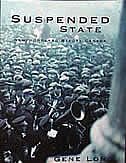Clark: Despite all the little problems it's fun isn't it?Take a look at the Tuesday editorial in The Telegram - "Danny vs. Goliath" - and you'll see the province's major daily newspaper decide to take a trip off the information highway and head straight into the boonies on the Hebron fiasco.
Ellen Griswold: No. But with every new day there's fresh hope.
 It's a bit like a scene from National Lampoon's Vacation, the first and funniest of the big studio movies written by the people who put together the popular counter-culture humour magazine of the 1970s and 1980s. Taking the family to Walley World in their brand new Family Truckster, patriarch Clark Griswold gets distracted and sends the car careening off the highway and into the Arizona desert.
It's a bit like a scene from National Lampoon's Vacation, the first and funniest of the big studio movies written by the people who put together the popular counter-culture humour magazine of the 1970s and 1980s. Taking the family to Walley World in their brand new Family Truckster, patriarch Clark Griswold gets distracted and sends the car careening off the highway and into the Arizona desert.The target of the editorial is ExxonMobil, the largest company in the world, which the Telly-torialist notes is in disputes with countries around the world over oil resources. The countries? Venezuela, Indonesia and Russia. They add a little tidbit of information that Exxon's retiring chief executive officer will get a retirement package valued at US$398 million. The Telly tells us that in Canadian dollars that amount is half the cost of supplying medical service to the province. Then they segue to an article from yesterday's Globe and Mail which the Telly dismisses as being "laudatory" of the oil giant, Exxon.
 As with the Telegram's weekend editorial, it's worth going back and taking a look at what the Globe actually printed on its pages. What's there is the corporate strategy that has made Exxon the biggest of big companies. What's there is a pretty good insight into how one of the players in the failed Hebron project looks at the world and it's from that insight that we can get a wholely different picture than the one the Telegram puts across the windscreen of our local Family Truckster.
As with the Telegram's weekend editorial, it's worth going back and taking a look at what the Globe actually printed on its pages. What's there is the corporate strategy that has made Exxon the biggest of big companies. What's there is a pretty good insight into how one of the players in the failed Hebron project looks at the world and it's from that insight that we can get a wholely different picture than the one the Telegram puts across the windscreen of our local Family Truckster."The disciplined approach to pursuing and selecting the most attractive investment opportunities continues to distinguish ExxonMobil," [outgoing Exxon CEO Rex] Tillerson told analysts in New York last month. "We are long-term driven, and we're patient. And we're not opportunity constrained."The focus is clearly on the most attractive investment opportunities - that means in simplest terms that Exxon is in business to make money and the current company leadership will look at global opportunities for the right place to invest its cash.
As much a penetrating insight into the flippin' obvious (PIFO) as those comments are, it's worth bearing in mind that Exxon is in business to deliver the maximum profit to its shareholders. Expect a hard bargain to be driven. Expect the company to want to make every project profitable in order to attract their capital. Expect them to at least ask for tax concessions - no one said Danny had to agree to them.
For another PIFO, take the reminder that capital is highly mobile these days. It isn't that companies write their own rules in the facile conclusion of the Telegram's editorialist. Rather, companies are doing what they do - make money - by putting their cash into the place where it gets the best return. And, as the Globe notes, there are more oil and gas development projects out there than ExxonMobil and the other oil companies can develop at one time. Competition is fierce.
And if there wasn't enough useful but obvious information in that small quote, remember that oil is a capital intense business. It takes deep pockets to find and develop oil, deep pockets the Government of Newfoundland and Labrador just doesn't have. They want our oil and we need their capital to develop our oil. Somewhere in there is a balance that works to the advantage of all. The same situation exists in places like Venezuela and while there is a hot dispute right now between its president and international oil companies, at some point that situation will change.
Flip down a bit further and one can see another relevant part of Exxon's strategy. Oil prices may be high now, but as in the 1980s that can change quickly.
"There is really no explanation for why oil trades where it does today at these prices," Mr. Tillerson said in a recent speech. "If you look to the long term, our view is that supply and demand fundamentals are going to return to levels that are reflective of prices that are more in line with historic prices than today."Oil prices are high today. But they are likely to be lower tomorrow. The provincial government would do well to bear that in mind both on the Hebron file and on its own financial planning. It's not like we haven't been laid low in the past as our grandiose dreams of perpetual high oil prices met the harsh reality of the marketplace.
As a result, Exxon is not opening the spigots to throw money at resource development.
Take all of the Globe's piece and one finds some food for serious thought, not the sort of apology for Big Oil the Telegram editorialist seems to think.
What's most interesting about the Telly editorial, though is not its sarcasm about Big Oil and the Big Money that goes with it.
Rather, it's curious that the Telegram's editorial matches perfectly with Danny Williams' talking points on the Hebron file, right down to the "Danny vs. Goliath" headline.
This issue is supposedly about the Premier taking on an external demon, full of cash, that is bent on milking poor victim Newfoundland and Labrador. "Who will fight for you?" as his old law firm slogan used to ask. Danny will.
The Telegram also picks up the Premier's line on Exxon's giant profits and the richness of its executive pay schemes, as if that really had anything to do with the Hebron deal. Sure it's something the Premier and his supporters have tossed out but that really isn't the point: even if Exxon had bent on equity - as the premier originally contended they had done - or dropped their request for a tax concession that is small against the size of the Hebron project, the company would still be able to fork over hundreds of millions in executive pay to the people who helped make the company as successful as it is.
What the Premier has been doing since the Hebron deal collapsed is spread a mixture of miniscule nuggets of information and much in the way of distraction. The goal is to avoid having to answer publicly the sorts of questions people like Telegram reporters might normally put to him - if he returned their calls. The goal is to dominate the domestic information landscape such that no one can or will question what happened on the Hebron file. The strategy works: The Telegram has even admonished us to support the Premier unquestioningly, to "dance with the one what brung us".
Why the Telegram editorialist decided to back the Premier early on - long before details of the failed deal became public - and continues to do so without question will have to remain a mystery.
All that can be said with some certainty is that on our collective trip to Walley World, the Telegram is happy as we leave the information highway and go off road.
At least Ellen was skeptical of Clark's driving skills once in a while.










